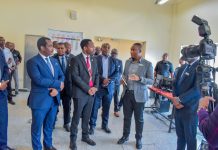By Faridah N Kulumba
Africa-Press – Tanzania. In 1992, the Republic of Tanzania re-introduced the politics of the multi-party system. In commemoration of Multi-party democracy in Tanzania on 1st July 2022, one of the government-owned print media Daily News published an article which was written by President Samia Suluhu to Tanzanians.
Political and Constitutional History of Tanzania
The United Republic of Tanzania was established in April 1964, following the amalgamation of the former independent state of Tanganyika and Zanzibar. The United Republic came about after more than 70 years of colonization. The mainland, Tanganyika, was first colonized by the Germans and later handed over to the British in the 1920s under the trusteeship system through a mandate from the League of Nations. Tanganyika attained independence, however, was achieved without the pattern of violence that dominated the struggle for independence in other African countries such as Kenya, Zimbabwe, and Mozambique.
Deviation
At independence in 1961, Tanzania crafted a constitution. Provisions were made for checks and balances among the three arms of government – the executive, the legislature, and the Judiciary. Immediately after independence, the regime in Tanzania acted contrary to the constitution. The constitution has been amended several times to recast state power in ways that increase the incumbent regime’s ability to cling to state power.
30 years of multi-party system in Tanzania
According to President Samia’s letter, it was a period of joys, sorrows, tribulations, and challenges. By the time when Tanzania returned to the system were difficult years. The early 1990s witnessed such challenges as the collapse of the former Soviet Union, civil war in Africa, genocide, and many political and economic conflicts in developing countries like Tanzania. Fortunately, the country managed to go through such a difficult period and continued with that culture 30 years later.
Objectives of the letter
President Samia explained that she wished to build a better Tanzania characterized by ‘reconciliation ad understanding’ Tanzanians, pointing out that the process to build a well-functioning multi-party democracy is far from over. She also took this advantage to congratulate Tanzanians and wished that the leaders that will come 50 to 100 years later will continue to lead a country united with non-discriminatory citizens and fight even if they disagree on how to run the country.
The re-introduction of a multi-party system
In February 1991, a Presidential Commission set up the Nyali Commission under the leadership of then Chief Justice Francis Nyali of Tanzania to collect the views of citizens and make appropriate recommendations on whether Tanzania should adopt a multi-party or single-party system. Only 20 percent of Tanzanians gave their opinions to the Nyali Commission, but the ruling Chama cha Mapinduzi (CCM), under the chairmanship of Julius Nyerere the first president of Tanzania, decided to go with the minority opinions citing both external and internal factors, including the fall of the Soviet Union, and then the multi-party system was approved.
Party-state in a multi-party system
Seventeen years after the dawn of liberal democracy Tanzania is still suffering from the hangover of single-party rule. There are many indicators. Tanzania is still largely a party-state within a multiparty political system. Politics is still dominated by the one-party generation, most of them in their late sixties and above. Political leadership in both the ruling and opposition political parties is still in the grip of the old guards with the dot-com generation waiting on the periphery.
Monopoly indicator
The ruling party CCM has succeeded in maintaining its supremacy over other 20 political parties, emerging a winner in all six multi-party elections that have taken place since 1995, when the first multi-party election was held.
Challenges of a multi-party system
The transition to multiparty democracy in Tanzania continues to be frustrated by several factors including institutional weaknesses in practically all political parties as manifested by the lack of party philosophy or ideology, the functioning of party structures and processes, lack of participatory internal democracy due to a deficit of communication between party leaders, followers and the population, Lack of resources and the dominance of personality cult together with the infiltration in politics by wealth individuals [wafadhili wa vyama] funding political parties with the sole aim to maintain the status quo are other factors holding political development in Tanzania.
Constitution the root cause
Tanzania is currently governed by the 1977 constitution that was formed under a single-party system. Opposition and critics are challenging it since it favors the ruling Chama Cha Mapinduzi party CCM. The reformists believe that one of the main results of a constitutional change would be the elevation of Tanzanians from the current situation that creates political and economic divisions.
Birth of dissatisfaction
The opposition actors argued that the current constitution gives too much power to the presidency which jeopardizes any mechanism of checks and balances within the government. They noted that Article 36 of Tanzania’s constitution gives power to the president to appoint and punish all public servants including those in the executive, parliament, and judiciary branches. Article 37(1) states:
President Samia’s assurance
In her letter, President Samia assured that her administration is initiating discussions on the best way Tanzania can improve its multi-party democracy. A 23-member presidential task force was formed to collect stakeholders’ views on the matter and already it has met with a number of individuals and organizations who have been active in championing political and legislative reforms in Tanzania.
Why supporting changes in the constitution now
President Samia believes that it is important to amend the constitution of Tanzania due to the fact that it will bring fair competition in the country’s elections and provide people with opportunities to elect people who can lead them.
For More News And Analysis About Tanzania Follow Africa-Press







